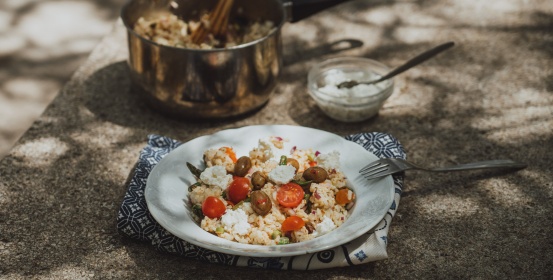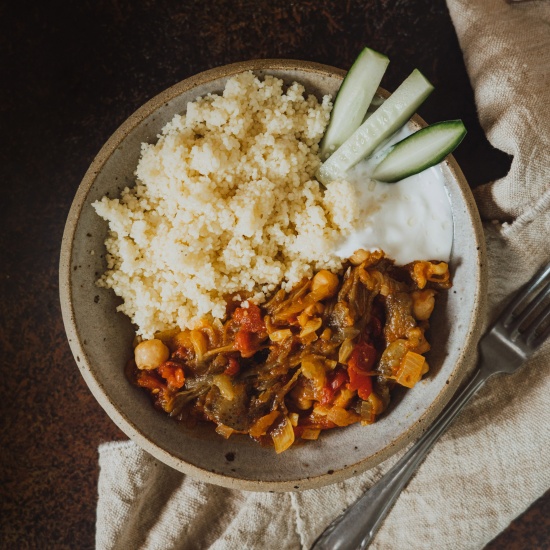Constipation in the elderly is an extremely common problem and its treatment needs to be approached with caution because older people are more sensitive to possible consequences of slow digestion. For most people, including the elderly, it is important to first establish the causes of constipation, and in most cases, it is also necessary to make some changes in eating habits. It is also extremely important to understand that balanced diet and other healthy habits have an advantage over taking medications.
Numerous studies have shown that a high intake of dietary fiber can significantly reduce and alleviate the symptoms of constipation. However, it is important to note that the point is in a sufficient intake of fiber on a daily basis, and not in a momentary increase of the intake.
Most of us do not consume enough fiber!
It is a fact that fiber is barely present in the diet of most of the people, especially in the West. One should be cautious when increasing the fiber intake since a sudden increase can lead to the worsening of the symptoms. It is recommended to increase the intake of soluble and insoluble fiber, which means that, besides more fruit and vegetables, we should also include whole-grain cereal in our diet.
But which sources of fiber improve digestion?
Some epidemiological studies have confirmed that kiwi and prunes have a beneficial effect on digestion, while unripe bananas are not recommended. Kiwi and prunes significantly increase the frequency of defecation and the volume of the stool itself. The stool is softer, and it is also very easy to eat these foodstuffs. Unripe bananas are rich in amylase-resistant starch (an enzyme that breaks starch down) so it is not recommended to eat them in case of constipation because they can additionally worsen the symptoms. Some studies have shown that problems with constipation can also be alleviated by eating fish.
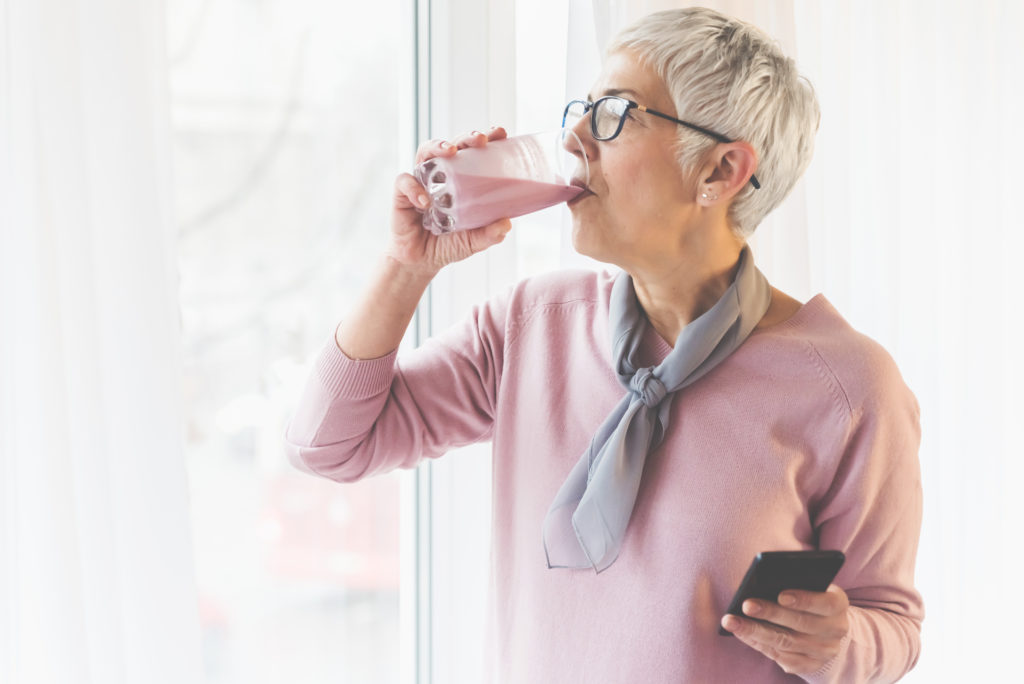
And what about probiotics?
We often associate the action of probiotics with a healthy intestinal microflora which plays an important role in regulation of digestion. Even though there are no studies that directly prove the connection between using probiotics and alleviating constipation, their usage is still recommended to older people because they stimulate the increase of the number of useful bifidobacteria, whose number in bowels goes down with age. Additionally, the research has shown that the composition of the intestinal microflora changes with age: the number of useful bacteria from Bifidobacterium family goes down, which can indirectly affect the occurrence of constipation.
Useful advice for treating constipation in older age
- Increase fibre intake to the recommended daily amount of 25 to 30 g; however, do this gradually to avert any worsening of the symptoms.
- Recommended fruit: apples, pears, raspberries, and dried fruit (prunes in particular).
- Recommended vegetables: carrots, courgettes, pumpkins, turnips, legumes, celery.
- Recommended cereals: oats, brown rice, wholegrain wheat products, buckwheat, millet.
- Add flax seeds and chia seeds to your diet as well.
- Consume more probiotic yoghurt, kefir, and other foods that are naturally rich in probiotics (pickled cucumbers without vinegar, mozzarela, non-pasteurised sauerkraut, cheddar cheese).
- Avoid unripe bananas, white flour products, fatty and spicy foods, alcoholic drinks, sweet carbonated beverages, sweets, snacks, and smoked products.
- Consume as little of non-fermented dairy products (such as milk) as possible.
- Increase physical activity, if your health allows it, as it is essential for good digestive function, wellbeing, and quality of life. One beneficial activity that is often recommended to the elderly is Nordic walking.
- Drink enough fluids. This is a vital rule, especially if you also aim to increase fibre intake. Only with sufficient hydration can fibre bulk up and do its task. Inadequate fluid intake or dehydration leads to compacted, hard stool. Patients with heart and kidney conditions must control their fluid intake. In such cases, the need for adequate hydration can represent a limiting factor.
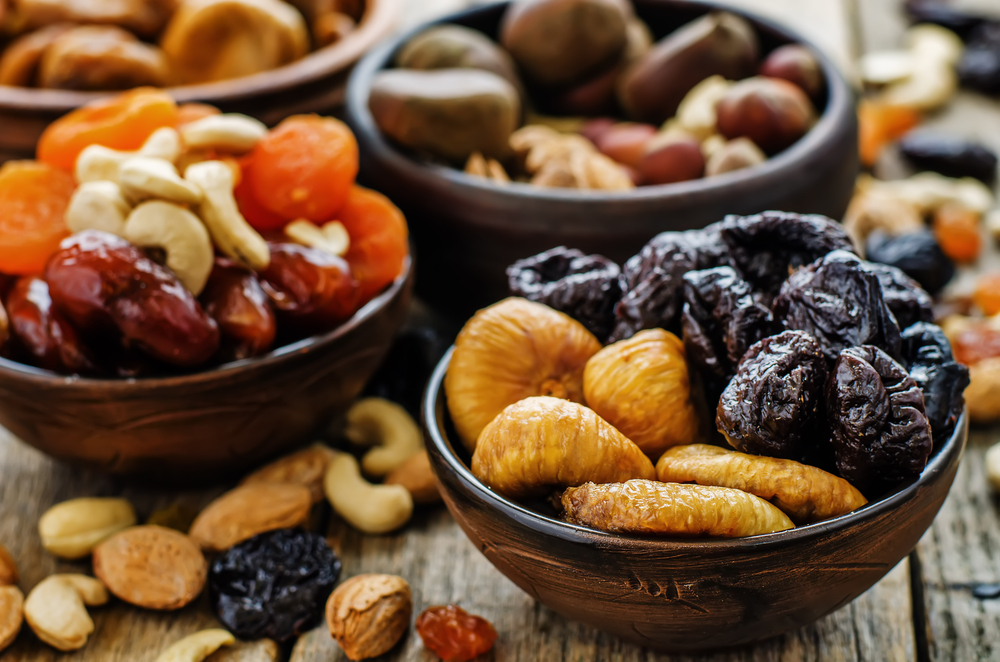
Healthy lifestyle is vital
The importance of a healthy lifestyle in getting rid of constipation is still being underestimated, so it is extremely important to point out that encouraging a balanced diet rich in fiber, together with hydration and exercise are the first step in the fight against slow digestion. Only if the change of lifestyle and dietary habits fails to help, a treatment with osmotic laxatives follows. They work on the osmosis principle by draining water from the wall of the colon which increases the stool volume and at the same time softens it for it to pass through the intestine more easily.
Osmotic laxatives are intended for everyone who, despite of a sufficient fiber intake, suffer from slow digestion or constipation. When choosing the right laxative, the best is to consult an expert who can also give advice considering the health condition of the person, i.e., the condition of the heart and kidneys. During the consultation, the expert or a doctor also takes into consideration the use of other medications or food supplements in order to prevent any undesired side-effects.
Donat: our ally in getting rid of constipation – regardless of age!
Osmotic laxatives also include Donat, completely natural mineral water, which is an excellent assistant in speeding up digestion, but which, on the other hand, does not cause any side-effects or addictions. Donat owes its effectiveness primarily to the above-average content of minerals which include sulphate salts and magnesium, which are vital for the digestive tract. The effectiveness of this combination has also been confirmed by a German clinical study which proved a few years ago that drinking 0,3 l of Donat on an empty stomach in the morning and 0,2 l before dinner stimulates digestion.
Donat does not have any negative effects on the body, and it is suitable for people of all age. It should only be avoided by patients who suffer from the acute renal failure, alkalosis, or slowed heart rate.
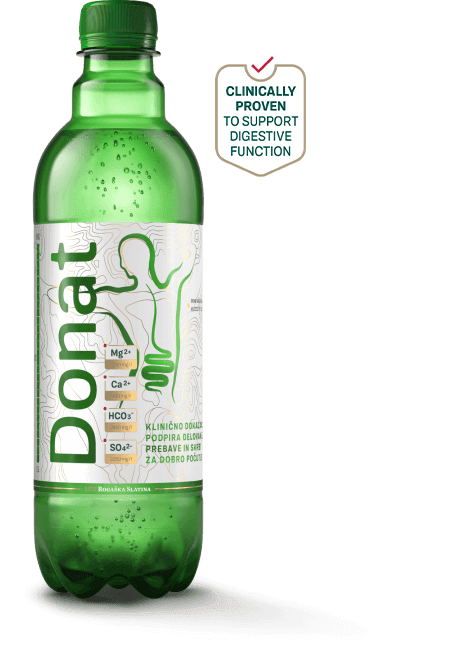
Frequently Asked Questions
1. Why does treatment of constipation in the elderly require special caution?
Relieving constipation and improving slow digestion in the elderly should be approached with caution because older people are especially sensitive to negative side-effects of constipation.
2. How to approach relieving constipation in older adults?
It is necessary to first try to relieve constipation by adapting one’s lifestyle, especially with a balanced diet. If such approach fails, it’s time for the next step: osmotic laxatives.
3. What are osmotic laxatives?
It is a type of laxatives that drain water from the wall of the colon which increases the stool volume. That way the stool softens and passes through the intestine more easily.
4. Why is it recommended to consult an expert before choosing the right laxative?
Because it is vital to adapt the choice of a laxative to the person’s health condition and specific difficulties, especially to the condition of the heart and kidneys. It is also important to take into consideration the medications and other supplements that the person is already taking.
5. Why are the elderly also recommended to drink Donat in elimination of constipation side-effects?
Donat natural mineral water is also one of osmotic laxatives because sulphates from the intestine wall soak up water, and magnesium relaxes the intestine muscles and accelerates peristaltic, i.e., rhythmic contractions of the digestive tract muscles.
Choose chapter:





